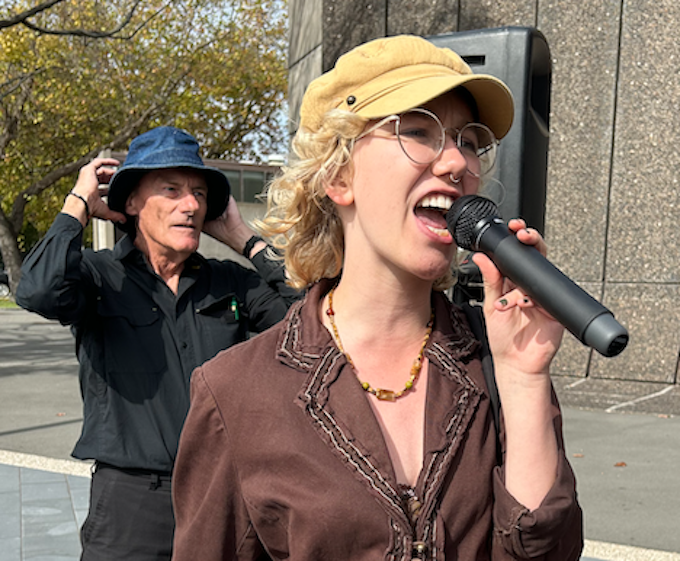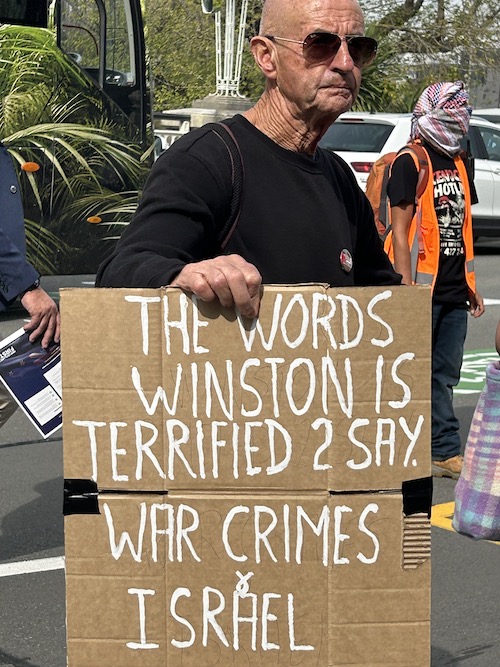
Tantanmen Report : By Saige England in Christchurch Ōtautahi
Like an unstoppable tide, pro-Palestinian and human rights protesters repeatedly interrupted New Zealand Deputy Prime Minister Winston Peters’ state of the nation speech at Christchurch Town Hall yesterday.
Echoing themes of Trumpism and Australia’s One Nation Party, Peters’ address was met with the relentless chants of around 250 demonstrators outside, declaring: “Complicity in genocide is a crime.”
John Minto, co-chair of the Palestine Solidarity Network Aotearoa (PSNA), condemned Peters’ stance on Palestine, calling it “sickening.”
Inside the James Hay Theatre, one protester after another rose to their feet, their voices unwavering as they condemned Deputy Prime Minister Winston Peters for his refusal to support those still suffering in Gaza and his silence on what they called an ongoing genocide.
Ben Vorderegger was the first of nine demonstrators who stood up to speak on behalf of those whose voices have been silenced—lost beneath the rubble, drowned out by the echoes of bombs and sniper fire.
Before security forcibly removed them, they spoke for the tens of thousands of Palestinians killed in Gaza—women, men, doctors, aid workers, journalists, and children—all victims of Israeli military strikes.
Gazan health authorities report that the official death toll has surpassed 50,000. But with countless bodies still buried beneath the debris, the true scale of loss remains immeasurable.

A Grim Reality: Gaza’s True Death Toll
The devastating toll of the Gaza conflict may be far higher than official reports suggest. A recent study by The Lancet, a leading medical journal, estimates the real number of deaths at up to 186,000—a staggering figure, with one-third of the victims being children. Every day, more lives are lost.
As one protester after another confronted Winston Peters, security forces forcibly removed them to the sound of a furious crowd chanting, “Out, out!”
Rather than acknowledging the protestors’ concerns, the Deputy Prime Minister responded with mockery and scorn. But he didn’t stop there—he turned his ire toward the media, unleashing a tirade against journalists.
The hostility in the room soon spread. Several audience members, emboldened by Peters’ rhetoric, turned on me as a journalist, demanding my removal.

Silencing Dissent: The Erosion of Free Speech and Press Freedom
The right to free speech wasn’t the only casualty inside Christchurch Town Hall—press freedom also took a hit. After reporting on the events, I was forcibly removed by security and police, without explanation, effectively barring me from the venue.
Meanwhile, Winston Peters—also serving as Foreign Minister—continued his speech, echoing the rhetoric of MAGA-style politics. His call to “Make New Zealand Great Again” came with no mention of human rights, no acknowledgment of climate change, and a thinly veiled contempt for the media, which has rarely held him to account.
In a democracy, silencing critics and restricting press access should be cause for alarm. Instead, it played out before an audience that cheered as voices of dissent were dragged away.
Peters’ Speech: A Masterclass in Division and Denial
Labeling the Palestine Solidarity Network Aotearoa (PSNA) as “Marxist fascists”, Winston Peters dismissed calls for justice while conveniently aligning himself with those who have historically supported violent colonization.
This divide-and-conquer strategy is nothing new—it’s the classic colonial playbook. Reward those who comply, ignore those who resist, and demand that the oppressed accept their fate or risk losing everything.
Peters offered no support for Te Tiriti o Waitangi, instead backing government efforts to undermine New Zealand’s founding partnership. His speech was littered with divisive rhetoric, from taking jabs at the Palestinian cause to mocking the Scots with a racist joke, all while championing continued mining—seemingly forgetting the lessons of Pike River.
No mention of climate change. No defense of human rights. Just more of the same populist dogma.
Outside, tensions escalated. Police donned black gloves—a signal they were ready to use pepper spray. One protester was arrested, allegedly for touching a car carrying NZ First officials, though witnesses contested this claim.
PSNA co-chair John Minto didn’t mince words: Peters’ refusal to denounce the ongoing slaughter of Palestinians was “bloody disgraceful.”

From Protest to Suppression: The Unfolding Drama at Peters’ Speech
The protester detained for merely “touching a car” was later released—without charge. Yet the event’s authoritarian undertones remained undeniable.
NZ First MP Shane Jones stormed out, met by protesters’ piercing cries:
“What if it was your grandchildren being slaughtered?” His response? Defensive gestures, but no answers.
Meanwhile, journalists faced their own battle. I was trespassed from the Christchurch Town Hall for re-entering to attend Winston Peters’ media conference. No reason was given—just an abrupt removal.
Peters’ contempt for the media is no secret; he made that clear throughout his speech. Ironically, he invoked Bill Clinton, a leader who—unlike Peters—faced relentless media scrutiny, not unquestioning loyalty.
The entire event reeked of fascist undertones—from the aggressive security response against hecklers to the silencing of journalists. The atmosphere brought to mind an infamous Jörg Haider press conference I once attended in Vienna, where the Austrian far-right leader threatened journalists with lawsuits for exposing his Nazi sympathies.
Yesterday’s scene was eerily similar. Audience members didn’t just shout down dissenters—they called for journalists to be removed entirely.
Blind loyalty over accountability. Suppression over scrutiny.
PSNA’s John Minto summed it up best, calling Peters “a modern Neville Chamberlain”, referencing Britain’s 1930s leader whose infamous appeasement of Nazi Germany failed to prevent catastrophe.
Peters has refused to condemn Israel’s war crimes, including the total blockade on humanitarian aid to Gaza. His speech was less of a state of the nation address and more of a populist spectacle—one that might as well have been drafted by Donald Trump himself.


Populism, Protest, and Silence: Winston Peters’ Gaza Stance Under Fire
The tense atmosphere at Winston Peters’ state of the nation speech bore striking echoes of right-wing populist rallies seen across the globe. Protesters were met with hostility, hecklers were dragged out, and a journalist was forcibly removed—creating an environment where dissent was drowned out by chants of loyalty.
New Zealand First supporters demanded unwavering admiration for their leader, reminiscent of past populist movements where questioning authority was unwelcome. Peters’ speech, which critics likened to rhetoric from Donald Trump’s playbook, sidestepped human rights concerns and climate change while taking jabs at the media.
Palestine Solidarity Network Aotearoa (PSNA)
Palestine Solidarity Network Aotearoa (PSNA) co-chair John Minto condemned Peters’ refusal to denounce Israel’s military actions in Gaza, drawing historical parallels to Neville Chamberlain’s policy of appeasement in the 1930s. Minto criticized the New Zealand government’s failure to take a firm stance on Israel’s ongoing military operations and humanitarian aid blockade, calling it “unprecedented in New Zealand history.”
With growing calls for sanctions against Israel, Peters and the National-led government remain notably silent. If he opposes the actions unfolding in Gaza, Minto argued, he has had ample opportunity to say so—but has chosen not to.

“Staged Questions, Stifled Voices: Winston Peters and the Battle for Conscientious Dissent”
Conscientious objectors who stand against human rights abuses find themselves labeled as enemies by Winston Peters. He engages only with journalists in carefully controlled press conferences—those who flatter him receive warmth in return.
His State of the Nation speech at the Town Hall carried a familiar tone. But erasing conscientiousness will not make New Zealand great. Instead, it will shrink the nation, silencing those who dare to defend their right to land, leaving behind a country diminished not in size, but in spirit.
Saige England is a journalist, author, and member of the Palestine Solidarity Network Aotearoa (PSNA). She is a frequent contributor to Asia Pacific Report.

